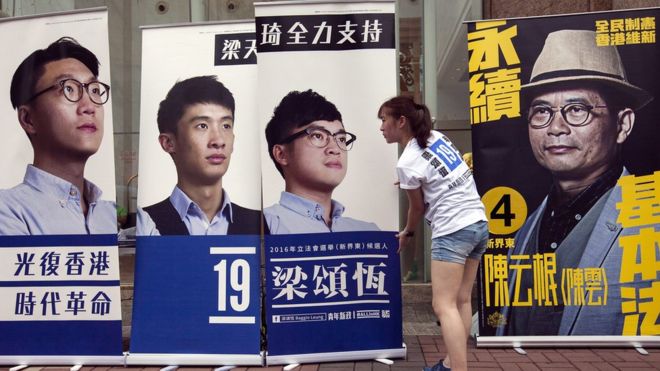-
Tips for becoming a good boxer - November 6, 2020
-
7 expert tips for making your hens night a memorable one - November 6, 2020
-
5 reasons to host your Christmas party on a cruise boat - November 6, 2020
-
What to do when you’re charged with a crime - November 6, 2020
-
Should you get one or multiple dogs? Here’s all you need to know - November 3, 2020
-
A Guide: How to Build Your Very Own Magic Mirror - February 14, 2019
-
Our Top Inspirational Baseball Stars - November 24, 2018
-
Five Tech Tools That Will Help You Turn Your Blog into a Business - November 24, 2018
-
How to Indulge on Vacation without Expanding Your Waist - November 9, 2018
-
5 Strategies for Businesses to Appeal to Today’s Increasingly Mobile-Crazed Customers - November 9, 2018
Voting gets underway in Hong Kong’s crucial election
Polls opened in Hong Kong Sunday for the specially administered Chinese city’s most crucial election since the handover.
Advertisement
More than 2.2 million people voted, according to the Electoral Affairs Commission, with a turnout of 58% – up from 53% in 2012.
Turnout was reported to be above average and election results are expected early Monday.
The vote for lawmakers in the Legislative Council is also the first since 2014 pro-democracy street protests rocked the Asian financial hub.
A younger generation of activists who joined those protests is openly advocating independence-a push some people warn could jeopardize Hong Kong’s economic and political future, but which seems to be gaining traction. Though the results will not have any direct bearing on Chief Executive C Y Leung, it is likely to have a significant impact on his second term. Young Hong Kong independence activists have stood for the first time in a city-wide legislative elections.
A housewife in her 60s, who wanted to be known only as Madam Fung, said she hopes the new legislature “will unite Hong Kongers so that Hong Kong people will not be so divided (like now)”. Numerous newcomers back independence for Hong Kong, a once-unthinkable idea that has become widely debated and which has added to divisions with the broader pro-democracy movement.
The disappearance previous year of five local men who sold books critical of the ruling Communist Party drew worldwide protests after they were revealed to be in the custody of mainland Chinese authorities.
“I urge you to vote because indifference will not lead us anywhere”.
Hong Kong’s pro-democracy camp wants to ensure is that it holds on to enough seats to block important bills, which need to be voted by a two thirds majority.
In a landmark victory, at least three of a handful of young campaigners calling for much more distance from Beijing were forecast to win seats with 90 percent of the vote counted. The council consists of 70 seats that accept both pro-Beijing politicians as well as the “pan-democrats”, politicians who support the idea that the civil liberties enjoyed under the British can be preserved only through democratic action.
“It is an open secret that they. pull strings, they make threats, they plant votes”, said Anson Chan, a former senior Hong Kong official.
In these high-stakes polls, if the pan-democratic camp fails to garner one-third of the 70 Legco seats, it will lose its veto power to overturn decisions of the government. But mainland China seems to have become more aggressive towards opposition movements in recent years.
The government has drawn a red line on advocacy of independence, barring six candidates from running and requiring hopefuls to sign a form acknowledging that the city is an inalienable part of China.
Still, some so-called “localists” have made the cut.
One 30-year-old voter who gave her name as Sandy said she favoured independence.
Carrie Lam Cheng Yuet-ngor, chief secretary for Administration of Hong Kong Special Administrative Region government, casts her vote at the polling station in German Swiss International School of Hong Kong, south China, Sept. 4, 2016.
Advertisement
Under current rules, the chief executive is selected by a 1,200-member committee of political insiders dominated by China loyalists, and subject to approval by the central government in Beijing.





























